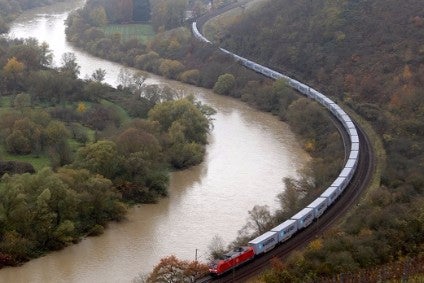
Global sporting goods retailer Decathlon has successfully completed a pilot to alter the way it transports its products from Asia to Europe, resulting in greater speed to market and a lowering of its carbon emissions.
The trial saw Decathlon use dedicated freight trains to transport its goods from its supplier factories in China to its main warehouse in France. The products were then sent to regional warehouses in Spain, Italy, Belgium, Romania, Hungary, Germany, the UK and Poland before being sent on to its European stores.
On average, travel times for transporting goods from production basins in Asia to Europe is around 41 days by boat and 26 days by shared train. Air is the fastest mode of transport but is more expensive and less environmentally friendly. Using the Wuhan-Dourges line, product arrives in less than three weeks at continental warehouses, ready for despatch to regional warehouses.
The block train, run by Damco’s rail freight team using Maersk Line containers, saw the transit time for the 10,815km journey reduced by exactly 20 days, compared to alternative ocean products. Carbon emissions were also reduced, by 36%, positioning it as a more environmentally conscious transportation alternative.
Until now, the 3,000 containers were transported on shared trains, arriving by train or truck via Duisberg, Germany. The new method means Decathlon can fill the train exclusively, increasing its annual volume by 300%. The company says its warehouse will take in an average of 30 containers per week, amounting to around 460,000 items.
Decathlon says the new transport strategy will allow it to invest in the development of its logistics platforms in order to create more value and jobs for its sites. As such, the company is planning to implement a “bursting platform” (EFP) in the north of France in 2019 to replace the one currently used by teams in Belgium.

US Tariffs are shifting - will you react or anticipate?
Don’t let policy changes catch you off guard. Stay proactive with real-time data and expert analysis.
By GlobalDataThe company’s Dourges team is also considering other ways of developing its multimodal transport. A project is currently underway to create a connection by barges between the Port of Dunkirk and its warehouse in France.
Decathlon says it wants to optimise the flow of its product in order to reduce its ecological impact and lower costs.
Currently, Decathlon employs around 17,000 globally, including 1,100 in production, 1,500 in logistics and 14,400 in services and stores. In China, where the company sources from around 500 suppliers, it opened 51 stores last year.
In Europe, Decathlon distributes to over six continental warehouses (CAC) including four in France, and 27 regional warehouses (RACs) of which ten are in France.
Demand for the China-Europe rail services has increased significantly in recent years, with rapid growth in high-value cargo segments, such as electronics, machinery and fashion goods, which need quick delivery to their final markets. In addition to existing platforms of sea- and airfreight, the block train solution has the potential of becoming one of the major modes of delivering goods.



